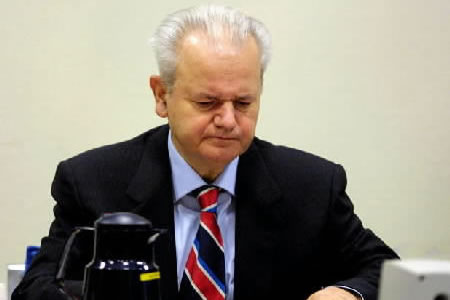Home
TRIBUNAL NOT RESPONSIBLE FOR MILOSEVIC'S DEATH
Report of the internal enquiry into the circumstances leading to Slobodan Milosevic's death in the UN Detention Unit was made public today. The accused was neither murdered nor poisoned; he did not commit suicide. The ICTY, the management of the UN DU and the Dutch physicians treating him are not responsible for his death. Manipulating his therapy, Milosevic was "was prepared to put his own life and health at risk"
 Slobodan Milosevic in the courtroom
Slobodan Milosevic in the courtroom The ICTY, the UN DU management and the Dutch physicians treating the accused are in no way responsible for Slobodan Milosevic's death. This would in brief be the main conclusion of the internal enquiry led by Australian judge Kevin Parker. The enquiry into the circumstances leading to Milosevic's death on 11 March 2006 was ordered by the ICTY president. Nothing has been found in the course of the enquiry, Judge Parker's report states, "to support allegations reported in some sections of the media that Mr. Milosevic had been murdered, in particular by poisoning".
The internal enquiry also ruled out suicide as a possibility. The fact that Milosevic did not comply with the therapy prescribed by the Dutch physicians and cardiologists and his "tendency to self-medicate" cannot be interpreted as "a sign of suicidal intent", Judge Parker says. On the other hand, the report concludes that by taking non-prescribed medication and reducing the therapeutic effect of the medication he was given, Milosevic “was prepared to put his own life and health at risk".
Over the past two and a half months, Judge Parker and his investigating team took statements from more than 60 persons – from the UN DU personnel and all the detainees in the block where Milosevic was housed, from the Dutch, Belgian, French, Russian and Serbian doctors that had examined or treated Milosevic, and from Marko Milosevic and the legal counsel of the accused.
Judge Parker's report dwells in particular detail on the top-notch medical care Milosevic had been receiving from his arrival in the UN Detention Unit on 29 June 2001. A number of physicians and specialists from several countries had been involved in his treatment. Among them was Dr. Mijailovic from the VMA, Military Medical Academy, who had been Milosevic's cardiologist until his arrival in The Hague. Dr. Mijailovic, the report states, visited the accused several times, handing over to the UN DU doctor the results of cardiology tests run at the VMA in April 2001 and warning him about the problems he had had with Milosevic as a patient. He had refused to comply with the treatment prescribed to him.
The reports gives a detailed account of every established and documented case of Milosevic's non-compliance with his prescribed therapy, refusal to undergo tests or to be hospitalized for further examinations, and his refusal to allow his medical records to be disclosed to the judges. It goes on to say that searches of his cell and the office he was given for the preparation of his defense turned up various drugs. In one case, there was a whisky bottle with a plastic stopper, to avoid setting off the metal detector.
The report also deals with the famous rifampicin, antibiotic used to treat tuberculosis and leprosy. Its presence was established in Milosevic's blood in a strictly controlled test on 12 January 2006. Two Dutch laboratories detected rifampicin levels in Milosevic's blood of 1.9 mg. In patients taking a daily dose of 600 mg of rifampicin, normal levels are between 0.5 and 1 mg. Rifampicin diminishes the therapeutic effect of the two drugs Milosevic was prescribed to treat his hypertension. This, Judge Parker's report concludes, "offers an explanation for the failure to achieve adequate levels of the prescribed
antihypertensive drugs in Mr. Milosevic's blood, despite adequate, even high prescribed dosages".
Apart from being "prepared to put his own life and health at risk", Milosevic had to have someone on the outside willing to bring the non-prescribed medication to him into the UN DU. This was made possible because the accused – defending himself – was accorded "privileged treatment" by the decision of the Trial Chamber. In practice, this regime extended to his visitors – legal counsel and witnesses. Although Judge Parker doesn’t label this as an "error", he recommends that the experience from the Milosevic case be used in future, with other accused defending themselves.
